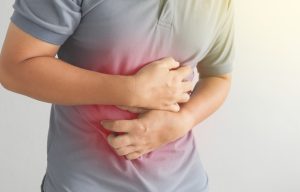 Stomach ulcers (also known as peptic ulcers) are common; approximately 1 in 10 Americans will develop one at some point in their lifetime. Ulcers are painful sores that develop in the lining of the stomach or small intestine due to direct exposure to digestive fluids. Normally, these fluids are held back by a protective mucus membrane, but certain factors, such as a Helicobacter pylori (H. pylori) infection or overuse of nonsteroidal anti-inflammatory drugs (NSAIDs), can cause this membrane to weaken, allowing fluids to leak through.
Stomach ulcers (also known as peptic ulcers) are common; approximately 1 in 10 Americans will develop one at some point in their lifetime. Ulcers are painful sores that develop in the lining of the stomach or small intestine due to direct exposure to digestive fluids. Normally, these fluids are held back by a protective mucus membrane, but certain factors, such as a Helicobacter pylori (H. pylori) infection or overuse of nonsteroidal anti-inflammatory drugs (NSAIDs), can cause this membrane to weaken, allowing fluids to leak through.
Some of the most common symptoms that may indicate you have a stomach ulcer include:
Burning upper abdominal pain: Many stomach ulcers cause a painful burning sensation above the belly button, which often becomes worse at night or on an empty stomach. This pain can occur intermittently over the course of several days or weeks. It may improve temporarily when using antacids, but the pain will always return eventually.
Stomach fullness: If you have an ulcer, you may find that you feel fuller more of the time and cannot take in as much food as usual. This happens due to inflammation in the lining of the stomach, leaving less room for food.
Bloody stool or vomit: When left untreated, ulcers can start to bleed. This can cause blood to appear in your stool (causing it to look black or like it has dark red blood in it) and vomit (blood may be visibly present or it may look similar to coffee grounds). A bleeding ulcer can also lead to additional complications such as anemia, holes in the stomach lining, blocked intestines, stomach cancer, or life-threatening internal bleeding.
If you notice potential early signs of a stomach ulcer, it’s best to visit a doctor right away. You can schedule an appointment at Flushing Hospital Medical Center’s Ambulatory Care Center by calling (718) 670-5486. If any of your symptoms indicate that the ulcer may be bleeding, please dial 911 or get to the nearest emergency room immediately.
All content of this newsletter is intended for general information purposes only and is not intended or implied to be a substitute for professional medical advice, diagnosis or treatment. Please consult a medical professional before adopting any of the suggestions on this page. You must never disregard professional medical advice or delay seeking medical treatment based upon any content of this newsletter. PROMPTLY CONSULT YOUR PHYSICIAN OR CALL 911 IF YOU BELIEVE YOU HAVE A MEDICAL EMERGENCY.

